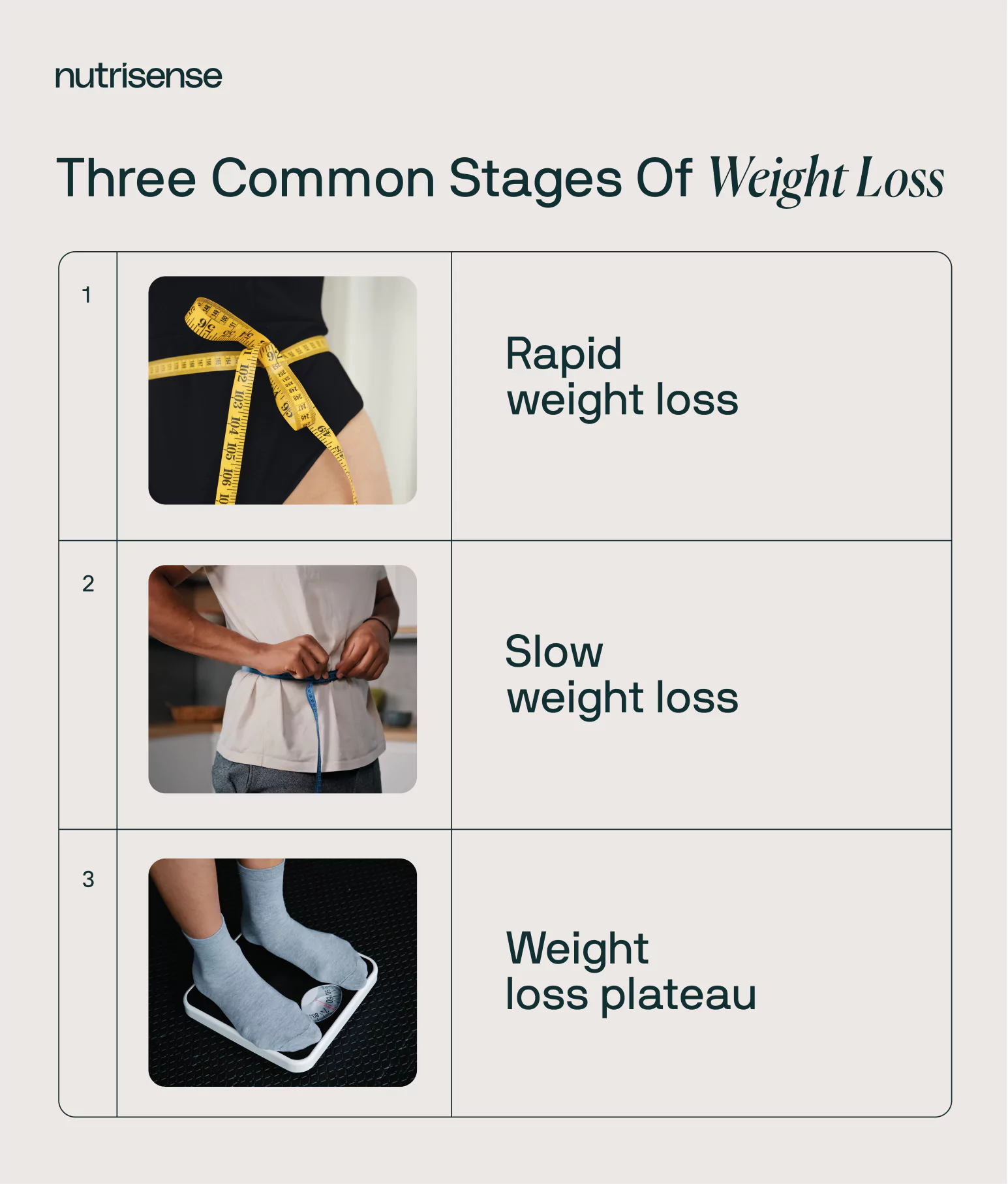The Stages of Weight Loss: Weight Loss vs. Fat Loss

Key Takeaways
If your heart is set on losing weight, you might be focusing on consuming fewer calories or putting in long bouts of cardio or resistance training at the gym. These methods can be part of an effective plan to lose weight, but to achieve your optimal results, it’s important to know whether your goal is to lose weight or to lose fat.
If you’re unsure of the difference between the two, don’t worry—we’ll explain the differences and outline what you can expect at each stage of your journey to help you plan your approach. Along the way, we’ll highlight strategies to help you reach your healthy weight goals, no matter what they are.
Understanding the Difference Between Weight Loss and Fat Loss
Let’s start by defining a few terms. Fat mass is the weight of all of the fat in a person’s body. Body fat percentage can be calculated using a few different types of assessments, including:
- Measuring your waist circumference
- Using skinfold calipers
- A process called hydrostatic weighing
Your fat levels are influenced by many things, including:
- Genetics
- Dietary intake, including amounts and ratios of macronutrients (fats, carbs, protein) and micronutrients (vitamins, minerals)
- Physical activity
- Other environmental factors such as stress levels or even environmental exposures
Lean body mass and fat-free mass are synonyms. They refer to everything in a person’s body that isn’t fat (including water, skeletal muscle, bones, organs, and connective tissue).
When you’re focused on weight loss, the weight you lose could be from fat loss or loss of fat-free mass, with different results in how you look and feel. For example, if you’ve lost weight but most of it is lean body mass, you may see muscle loss. This might negatively impact your metabolic rate, among other areas of metabolic health.
Conversely, if your weight hasn’t changed, you may have gained lean body mass while losing fat mass, causing your body to have a different silhouette. This is what is also known as body recomposition.
The Different Stages of Weight Loss

A healthy weight can help you to manage your blood sugar, cholesterol, and reduce your risk for chronic diseases such as:
- Heart disease
- Type 2 diabetes
- Cancer
- Osteoarthritis
- Liver and kidney disease
- Sleep apnea
- Depression
Research has shown that losing as little as five percent of your body weight can come with health benefits such as reduced inflammation, more sleep, an improved mood, and even an increased libido.
Most weight loss plans focus on a calorie deficit, meaning you’ll have to restrict calories or exercise more to reduce your net calories by that amount. This is the basis for the calories-in, calories-out model.
But while tracking calories as part of a weight loss program can make a difference, it’s far from the full story.
For many people, a weight loss journey may happen in a few different stages, so let’s take a closer look at what can happen at each one.
Rapid Weight Loss Stage

During the first few weeks of trying to lose weight, you may notice that the weight comes off more quickly. Weight loss during this first stage can be largely attributed to a loss of glycogen stores and therefore water weight—not necessarily fat loss.
Glycogen is stored in the liver and skeletal muscle as reserves for the body to turn into glucose when it’s not getting enough carbohydrates. It's important to drink plenty of water during this stage, as hydration supports many important functions in the body.
Slow Weight Loss Stage
In the second stage of weight loss, you may find that it takes longer to lose the same amount of weight that you lost in the first stage. But this time, you may lose more fat mass.
A study comparing rapid weight loss to slow weight loss found that the rapid weight loss group lost more lean body mass and water weight, whereas the slow weight loss group also lost body fat.
One reason that weight loss can slow at this stage is that your basal metabolic rate (BMR), also called resting metabolic rate (RMR), may adapt. Your basal metabolic rate is the amount of energy your body needs to maintain its current weight.
To compensate for a decrease in net calories, your body’s metabolic rate slows down. Taking a gradual rather than purposefully rapid approach may take longer to slow the rate at which it burns calories, supporting sustained weight loss over time.
.webp)
The good news is you may be able to modestly change your basal metabolic rate by increasing the amount of lean body mass (in the form of muscle) you have. Muscle can help you to lose weight because it is more metabolically active than fat, meaning that the more muscle you have, the more calories you’ll burn.
Any kind of exercise can help you to lose weight, and adding strength training to your routine can help you gain muscle mass that’s needed to burn calories both while exercising and at rest.
Plateau Stage
It’s not uncommon to hit a weight loss plateau. For many people, this happens around six months into a weight loss plan. A weight loss plateau may be caused by many things.
Hitting a plateau can be frustrating, especially if it feels like you’re doing all of the right things to lose weight. The most important thing is to not give up. Instead, refer to some of the tips we’ve listed below.
7 Strategies to Help You Reach a Healthy Weight Loss Goal

Now that you understand the role of your metabolic rate in weight loss, you can use that knowledge to your benefit by following these steps.
1) Fill Your Kitchen with Healthy Food
What is “healthy food”? Generally, we can think of healthy food as containing a variety of nutrient-dense whole foods with minimal processing. However, individual tolerance to different foods may vary, and some customization is necessary when finding the best diet for you. Working one-on-one with a dietitian or licensed nutritionist can be helpful.
Many factors can affect your weight loss success, including blood sugar balance, which is related to hormone balance. A balanced diet helps to regulate your glucose levels.
Dramatic swings in your glucose as well as chronically dysregulated glucose levels can negatively impact appetite, hormone balance, and how your body regulates body composition. can increase your level of insulin, which tells your body to store, rather than burn, fat. Conversely, maintaining healthy glucose levels may help support a number of metabolic functions impacting weight.
2) Meet Your Protein Needs
Getting enough protein is important when you’re trying to lose weight. Not only does protein help you to feel full, but protein provides building blocks for hormones, neurotransmitters, and other molecules that help regulate many metabolic functions directly and indirectly impacting weight.
Adequate protein intake is essential for building muscle, which can boost your metabolic rate. If you’re active, aim for one to two grams of protein per kilogram of body weight. Some studies suggest that aiming for no less than 1.2 to 1.6 grams per kilogram of body weight may be particularly important for building muscle, though more may be needed for some people.
3) Reduce Ultra-Processed Foods

Following a diet of whole, unprocessed foods is generally considered healthy advice, but it’s particularly helpful when you’re trying to lose weight.
A study comparing an unprocessed to an ultra-processed diet showed that a diet of processed foods increased the hunger hormone ghrelin, while an unprocessed diet increased the appetite-suppressing hormone PYY and resulted in increased insulin sensitivity. Ultra-processed foods may also be more likely to contribute higher amounts of added sugar and “empty” calories, which are linked to weight gain.
4) Drink Plenty of Water
If you need a reason to drink more water, here’s one: drinking enough water may support lipolysis, the metabolic process by which cells burn fat. Increased hydration is hypothesized to support the processes by which mitochondria, the energy powerhouses of cells, convert fatty acids into energy.
5) Get Enough Sleep

Studies show that when you’re sleep-deprived, you’re more likely to overeat, undermining your dieting efforts. Sleep deprivation also reduces insulin sensitivity, which may negatively impact weight.
Prioritize quality sleep by getting seven to nine hours per night, and practice good sleep hygiene by establishing a consistent sleep schedule, creating a quiet and cool environment conducive to sleep. If you struggle with sleep, consider taking a deeper look at your diet. What and how you eat can have a big impact on your sleep as well.
6) Reduce Your Sugar Intake
Unsurprisingly, a diet high in sugar can lead to elevated blood sugar levels. High levels of blood glucose are negatively correlated with weight loss.
High intake of added sugar is also an independent risk factor for weight gain and obesity.
7) Get Adequate Exercise

Exercise in the amounts appropriate for your body can also play a significant role in weight loss and can positively affect your body composition. Physical activity levels may vary for everyone, and it’s important to take your unique needs into consideration when it comes to exercise.
Resistance exercises, cardio, and traditional strength training can all be included as part of a workout plan that can support healthy blood sugar levels, boost your metabolic rate, and can support a reduction in your overall body weight.
Find the right Nutrisense programto turn insight into progress.
Go Beyond Glucose Data with Nutrisense
Your glucose can significantly impact how your body feels and functions. That’s why stable levels are an important factor in supporting overall wellbeing. But viewing glucose isn't enough. Nutrisense, you’ll be able to learn how to use your body's data to make informed lifestyle choices that support healthy living.
One-to-one coaching
Sign up to access insurance-covered video calls to work with a glucose expert: a personal registered dietitian or certified nutritionist who will help tailor your lifestyle and diet to your goals.
Monitor and measure what matters
With the Nutrisense CGM Program, you can monitor your glucose with health tech like glucose biosensors and continuous glucose monitor (CGM)s, and analyze the trends over time with the Nutrisense App. This will help you make the most informed choices about the foods you consume and their impact on your health.
Find your best fit
Ready to take the first step? Start with our quiz to find the right Nutrisense program to help you take control.

Heather is a Registered and Licensed Dietitian Nutritionist (RDN, LDN), subject matter expert, and technical writer, with a master's degree in nutrition science from Bastyr University. She has a specialty in neuroendocrinology and has been working in the field of nutrition—including nutrition research, education, medical writing, and clinical integrative and functional nutrition—for over 15 years.




